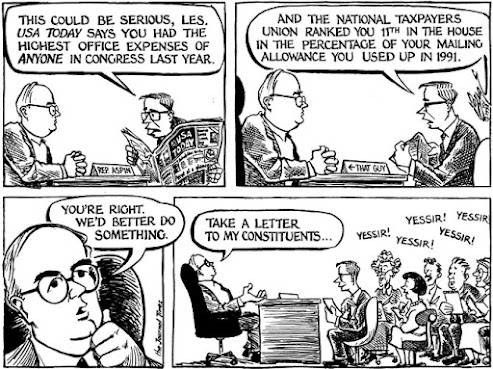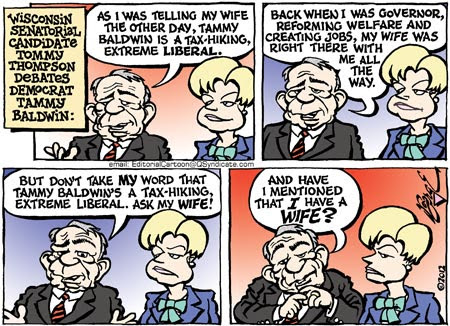There's still just over a whole week of those ghastly campaign commercials bombarding us on the TV, radio, social media, YouTube, and front yards. So let's take a break from Election 2022...
 |
| in UW-Parkside Ranger, Oct. 21, 1982 |
...but first, this commercial from Election 1982.
Scott McCallum was running in Wisconsin for the senate seat held by William Proxmire, and aired a TV ad arguing that he was sympathetic to voters suffering from the Reagan recession and offering his unemployed brother John as proof.
McCallum's ad didn't work, even though Proxmire didn't campaign on television at all. I suppose Wisconsin voters actually rewarded Proxmire for that.
 |
| in UW-Parkside Ranger, Oct. 28, 1982 |
Pete Jansson was the Republican running against my district's congressman, Democrat Les Aspin. At a candidate forum hosted by the University of Wisconsin - Parkside, Jansson campaigned against what he called "Aspinomics." I suppose that was an applause line in any GOP crowd, but it fell flat in the mixed audience on a university campus.
 |
| in Racine Journal Times, Oct. 7, 1992 |
1982 was the Democrats' year, and Les Aspin cruised to a seventh term. By 1992, he was firmly ensconced as the First District's Congressman, Chair of the House Armed Service Committee, and running for his twelfth.
 |
| in Racine Journal Times, Oct. 20, 1992 |
Senator Robert Kasten (R-WI) came to office in the Republican sweep of 1980 and survived the Democratic wave of 1986, but sailed into strong headwinds in 1992. He painted his Democratic rival, Russ Feingold, as a dangerous radical — which is the standard Republican tactic — but then likened his own positions to those of Wisconsin's Junior Senator, Democrat Herb Kohl, and, incredibly, the Democrats' presidential candidate.
It is impossible to imagine any Republican since then offering themselves up as Almost Like Bill Clinton, or any other Democrat. Since the rise of Newt Gingrich in 1994, any hint of bipartisanship has become anathema in the GOP.
 |
| in UW-Milwaukee Post, Oct. 29, 1992 |
Then there was the ad Feingold filmed greeting voters at The Joke Shop in Waukesha. The owner of the store, Jeffrey Campbell appeared in the ad, saying "Yes, it is," in response to Feingold asking "Is this a joke shop?"
Campbell was so upset afterward that Feingold's ad made him appear to support the Democratic candidate that he got himself into a Kasten ad swearing his loyalty to the Republican incumbent. Kasten's ad culminates with its narrator asking, "If we can't trust Russ Feingold's ads, can we trust Russ Feingold on crime, welfare reform or taxes?"
Jump we now to 2002: Drawing for a national LGBTQ+ audience, I only find an excuse to cartoon about local political races when there is a queer angle to one. My one such opportunity in October of 2002 came with the contest in Montana for the U.S. Senate seat held by Democrat Max Baucus.
This time, it was the Democrats running a homophobic television spot.
 |
| for Q Syndicate, October, 2002 |
Challengers have one advantage in these ads in that they can pick and choose any one vote by the incumbent, even on a procedural matter, to accuse the incumbent of being against something that sounds popular or for something that can be given an unpleasant nickname. Republican Mike Taylor didn't have a voting record for Sen. Baucus to comb through, but someone at the Democratic Senatorial Campaign Committee dug up video of Taylor when he owned a cosmetology shop in Denver about ten or so years earlier.
The ad (paid for by the DSCC, not the Baucus campaign) accused Taylor of embezzling funds from the shop. The visual of Taylor massaging a male customer's face insinuated that Taylor might be gay. Whether it was due to the allegation or the insinuation, it was enough to prod a weepy Taylor to withdraw from the race at the 11th hour.
 |
| for Q Syndicate, October, 2012 |
Come 2012, I seized the opportunity to return to Wisconsin politics in my syndicated cartoon when former Governor Tommy Thompson challenged incumbent Senator Tammy Baldwin in a televised debate. While he didn't engage in any overt anti-LGBTQ+ rhetoric against the only openly lesbian Senator at the time, he did seem to make an unusual number of references to Mrs. Tommy Thompson.
I've found Senator Baldwin's a challenging face to draw, and I tried to make this caricature as simplified as possible. In the end, I don't think this approach worked, and I haven't used it since.
✍
That brings us up to the present, so that's it for today's installment of congressional campaign cartoons past. We now return you to your regularly scheduled campaign commercials.
No comments:
Post a Comment